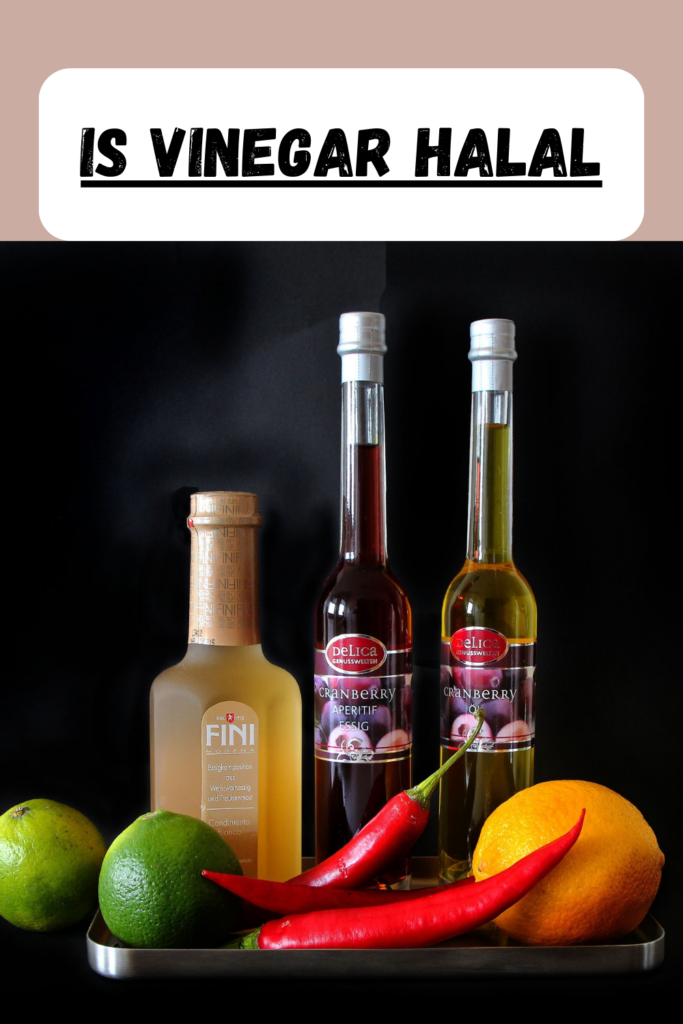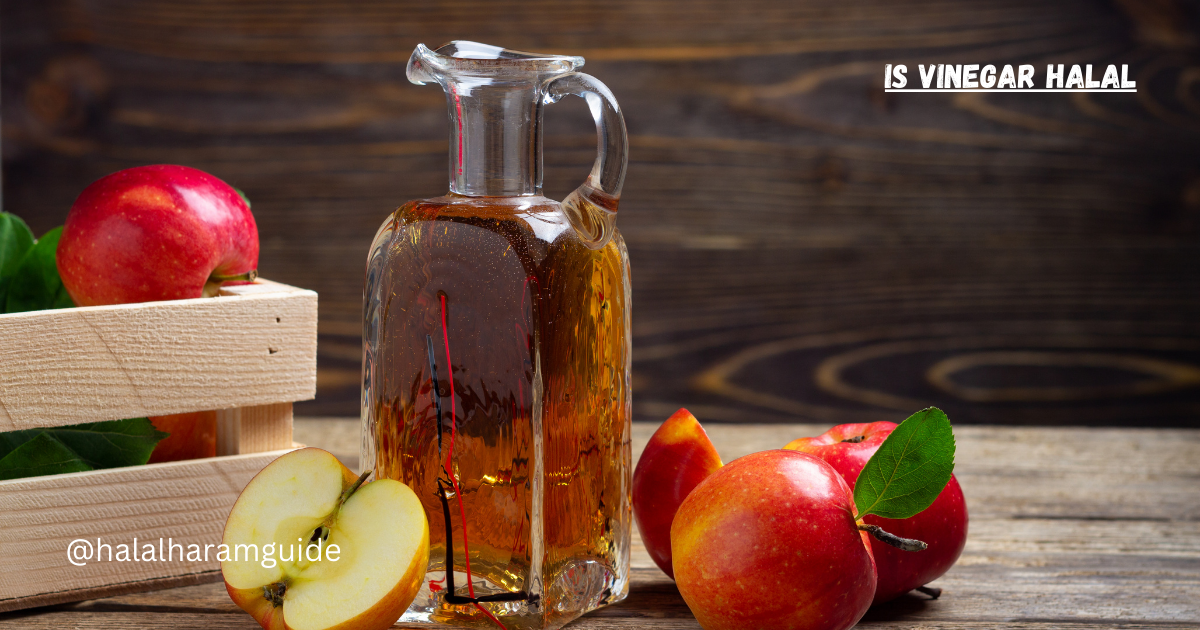Welcome to our blog, where we dive into the intriguing world of food and its compatibility with various dietary restrictions. In today’s discussion, we’ll explore the question: Is vinegar halal?
If you’ve ever wondered whether this commonly used ingredient aligns with Islamic dietary guidelines, you’re in the right place.
We’ll unravel the mysteries surrounding vinegar and its halal status, providing you with a clear understanding of its place in a halal diet. So, let’s get started on this flavorful journey of discovery!
What is vinegar?
Vinegar is a versatile and acidic liquid primarily composed of acetic acid and water, with small amounts of other compounds, such as flavourings and minerals. It is produced through a two-step fermentation process.
In the first step, sugars, often derived from various sources like fruits, grains, or rice, undergo fermentation by yeast or acetic acid bacteria to produce alcohol. This initial fermentation process is akin to that seen in the production of alcoholic beverages.
In the second step, acetic acid bacteria, typically Acetobacter, further transform the alcohol into acetic acid through oxidation. This oxidation process is responsible for the distinctive sharp, sour taste and robust aroma that characterise vinegar.
Due to its acidity, vinegar is a culinary staple, enhancing the flavours of dishes in various cuisines worldwide. Beyond its culinary uses, vinegar finds application in pickling, preserving, and as a condiment.
Moreover, it has been explored for potential health benefits and serves as an effective household cleaning agent, thanks to its natural acidity.
Is Vinegar Halal?
Vinegar is generally considered halal (permissible) in Islamic dietary guidelines. The permissibility of vinegar in Islam is based on the fact that it is produced through a natural fermentation process that converts alcohol into acetic acid.
This process transforms the alcoholic content into a different substance, and as a result, the final product (vinegar) does not contain intoxicants or alcohol.
There are some important considerations to keep in mind regarding vinegar in Islamic dietary practices:
Source of Vinegar: The source of the vinegar matters. Vinegar that is derived from halal sources, such as grapes, dates, or grains, is considered halal without question. However, vinegar produced from wine or other non-halal sources would not be considered halal unless it has undergone a complete transformation into acetic acid.
Alcohol Content: It is crucial that the vinegar has undergone complete fermentation, converting all alcohol into acetic acid. If any significant amount of alcohol remains in the vinegar, it may not be considered halal.
Additives and Flavors: Some commercially produced flavoured vinegars may contain additives or flavourings that could be of concern in terms of halal status. It’s essential to check the ingredients label for any non-halal components.
In summary, vinegar made from halal sources and processed to eliminate alcohol content is generally considered halal in Islamic dietary practices. Muslims should exercise caution when choosing vinegars, especially if they are unsure about the source or production process.
Reading labels and seeking guidance from knowledgeable sources, such as religious authorities or halal certification organisations, can help ensure compliance with halal dietary requirements.
Why is it not permissible to change wine to vinegar
In Islamic jurisprudence, it is generally permissible to transform wine into vinegar because the process of turning wine into vinegar involves a chemical change that eliminates the intoxicating properties of the alcohol. Here are some reasons why this transformation is considered permissible:
Complete Transformation: When wine is converted into vinegar, it undergoes a significant chemical transformation. The alcohol in the wine is oxidised and converted into acetic acid, which is the primary component of vinegar. This transformation changes the chemical composition and properties of the liquid, rendering it non-intoxicating.
Prohibition of Intoxicants: Islam prohibits the consumption of intoxicants, including wine and any substance that can cause intoxication. Vinegar, after the transformation process, no longer possesses intoxicating properties and, therefore, does not violate this prohibition.
Beneficial Uses: Vinegar has various culinary and practical uses in cooking, food preservation, and cleaning. Allowing the transformation of wine into vinegar makes it possible for Muslims to utilise a useful and versatile substance without violating Islamic dietary laws.
Consistency with Islamic Principles: The permissibility of this transformation aligns with the broader Islamic principle that considers necessity and benefit in legal rulings. In this case, the transformation of wine into vinegar serves a useful purpose and does not promote or encourage the consumption of intoxicants.
It’s important to note that while the transformation of wine into vinegar is generally permissible, strict guidelines must be followed to ensure that the fermentation process is complete, and no significant amount of alcohol remains in the final product.
Additionally, the source of the wine and the vinegar production process should be in accordance with halal principles to maintain its halal status. As with any matter related to Islamic jurisprudence, seeking guidance from knowledgeable religious scholars or authorities is recommended to ensure compliance with Islamic dietary laws.
How is it produced?
Vinegar is produced through a two-step fermentation process:
Alcoholic Fermentation: In the first step, sugars are converted into alcohol by yeast or other microorganisms. This step is similar to the process used in making alcoholic beverages like wine or beer. The type of sugar and the source of the sugars can vary depending on the type of vinegar being produced. For example, apple cider vinegar is made from fermented apple juice, while wine vinegar comes from fermented grape juice.
Acetic Acid Fermentation: In the second step, the alcohol produced in the first step is further fermented by acetic acid bacteria, typically Acetobacter. These bacteria convert the alcohol into acetic acid through a process known as oxidation. This acetic acid is what gives vinegar its characteristic sour taste and pungent aroma.
What Does Vinegar Contain?
Vinegar primarily contains acetic acid and water, with the exact composition varying depending on the type of vinegar and its source. The key component, acetic acid, is responsible for vinegar’s distinctive sour taste and pungent aroma.
Alongside acetic acid, vinegar may contain trace amounts of other compounds, such as flavourings and minerals, which can influence its taste and appearance. The specific composition of vinegar can also be influenced by the raw materials used in its production, such as fruits, grains, or wine.
Overall, vinegar is prized for its versatility in cooking, preservation, and cleaning, thanks to its acidic nature and unique flavour profile.
Different Types Of Vinegar
Certainly, here are 15 different types of vinegar:
1.White Vinegar
2.Apple Cider Vinegar
3.Red Wine Vinegar
4.White Wine Vinegar
5.Balsamic Vinegar
5.Rice Vinegar (including white, black, and red varieties)
7.Malt Vinegar
8.Sherry Vinegar
9.Champagne Vinegar
10.Coconut Vinegar
11.Date Vinegar
12.Black Vinegar
13.Raspberry Vinegar
14.Tarragon Vinegar
15.Fig Vinegar
Do All Types Of Vinegar Contain Alcohol?
No, not all types of vinegar contain alcohol. While many types of vinegar are produced from a fermentation process that involves alcohol initially, the alcohol is typically converted into acetic acid during the fermentation process, resulting in vinegar. Therefore, the final product, such as common white vinegar or apple cider vinegar, does not contain significant amounts of alcohol.
However, it’s important to note that some specialty vinegars, such as certain fruit-infused or wine-based vinegars, may retain trace amounts of alcohol due to the specific fermentation and ageing processes used.
These levels of alcohol are usually very low and do not have intoxicating effects. Nonetheless, for individuals who avoid alcohol for religious, health, or personal reasons, it’s advisable to check the label or consult with the manufacturer to ensure the vinegar meets their requirements.
What Are The Halal Vinegar Options?
For individuals following a halal diet, here are some commonly available halal vinegar options:
White Vinegar: White vinegar is typically halal as it is produced from the fermentation of grain alcohol, and the alcohol content is converted into acetic acid during the fermentation process.
Apple Cider Vinegar: Apple cider vinegar is generally halal as it is produced from fermented apple juice, and it does not involve the use of alcohol in its production.
Rice Vinegar: Rice vinegar, including white, black, and red varieties, is usually halal as it is made from fermented rice and does not typically involve the use of alcohol.
Date Vinegar: Date vinegar is halal and is made from the fermentation of date palm sap. It is commonly used in Middle Eastern and North African cuisines.
Coconut Vinegar: Coconut vinegar is halal and is produced from the sap of coconut flowers. It has a slightly tangy flavour and is used in various dishes and sauces in Southeast Asian cuisines.
Balsamic Vinegar: Balsamic vinegar is generally considered halal, but it’s essential to check the label for any additives or flavourings that might not comply with halal dietary guidelines.
Why Is Vinegar Halal In Islam?
Vinegar is considered halal (permissible) in Islam because it undergoes a natural transformation process that removes its intoxicating properties. Initially, vinegar is produced from the fermentation of sugars, often derived from sources like fruits or grains, into alcohol.
However, during a subsequent fermentation process, this alcohol is further converted into acetic acid, fundamentally changing the chemical composition of the liquid. As a result, vinegar no longer contains intoxicants and, therefore, complies with Islamic dietary laws, which strictly forbid the consumption of alcohol and other intoxicating substances.
This permissibility allows Muslims to utilise vinegar for culinary and practical purposes while adhering to their religious dietary guidelines.
Conclusion
In conclusion, vinegar is generally considered halal in Islam due to its transformation process that eliminates intoxicating properties. This allows Muslims to use vinegar for various culinary and practical purposes without violating Islamic dietary laws, which prohibit the consumption of alcohol.
However, it’s essential to ensure that vinegar is sourced from halal ingredients and that the fermentation process is complete to maintain its halal status.
Frequently Asked Questions (FAQs)
Is White Vinegar Halal?
White vinegar is typically considered halal because it is made from the fermentation of grain alcohol, and the alcohol content is converted into acetic acid during the fermentation process.
Is Wine Vinegar Halal?
Wine vinegar can be halal if it is produced from halal wine or if the alcohol content is fully converted into acetic acid during fermentation. However, it’s essential to ensure that it is produced and sourced in accordance with halal principles.
Is Balsamic Vinegar Halal?
Balsamic vinegar is usually halal, but it’s important to check the label for any additives or flavourings that might not comply with halal dietary guidelines.
Is Rice Vinegar Halal?
Rice vinegar, including white, black, and red varieties, is generally halal as it is made from fermented rice and does not typically involve the use of alcohol in its production.
Is Spirit Vinegar Halal?
Spirit vinegar is produced from the distillation of fermented grain alcohol. Its halal status may be questionable, especially if it is not specified that the alcohol content has been completely converted into acetic acid during the manufacturing process. Careful examination of the product is advised.
Is Malt Vinegar Halal?
Malt vinegar is halal if it is made from halal sources and the alcohol content is fully transformed into acetic acid during fermentation. It is commonly used with fish and chips in British cuisine.
- “Is Lobster Halal? Understanding Its Permissibility”
- “Is Drawing Haram in Islam? Understanding the Perspective”
- “Is Fermented Kimchi Halal? Exploring Kimchi’s Halal Status”
- “Is Collagen Halal? Unveiling the Halal Status of Collagen”
- “Is Wine Vinegar Halal? Unveiling Its Permissibility”


